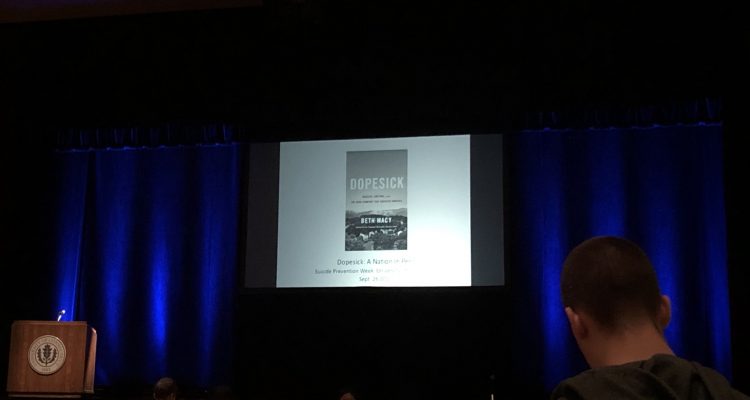By Sophia Scorziello
On Thursday, September 26, journalist and author Beth Macy spoke at the University of Connecticut to bring awareness to an epidemic that is killing more than 130 Americans every day.
Macy was this year’s keynote speaker for UConn’s annual Suicide Prevention Week. This year’s theme was “Listen Louder,” a call for the UConn community to take a break from their busy lives to hear the voices of those hurting around them.
Her talk took place at Jorgensen Center where about 100 people came to listen. Focusing solely on her latest book, “Dopesick: Dealers, Doctors and the Drug Company that Addicted America,” Macy spoke about the opioid crisis that has blighted America.
After writing for the Roanoke Times in Virginia for over 20 years, Macy left to write books full time. She wrote two books, “Truevine” and “Factory Man,” before shifting her focus to the epidemic.
“Dopesick” follows the lives of Appalachia Americans struggling with opioid addiction, and the families and communities she’s seen consumed by it.
Macy began her talk the same way she does most—with two words: “I’m sorry,” speaking to the great number of deaths this epidemic has caused.
Macy explained that she truly became aware of this epidemic in 2012, after hearing about a high school student in an affluent neighborhood of Roanoke, Virginia, who was on trial after a classmate overdosed on prescription opioids that he sold.
She soon expanded her investigation of this opioid epidemic to the rest of Appalachia. By 2015, she said there “was no denying it.”
Drug dealers preyed on prescription opioid abusers who lost access to these drugs and were suffering from withdrawals, or in colloquial terms, were dope sick, Macy explained. To ease their symptoms, heroin was dealt to them instead, leading to an expansion in opioid addiction.
Macy believes that stigmas surrounding opioid abusers, such as that treatment will be misused, that they will only relapse, that they chose to be in this place and many other hypotheticals, is where a lot of the problem lies.
“Every person I met that was in a low place did not want to be an addict,” Macy said during an interview preceding her talk. “They didn’t plan to be.”
Without this kind of awareness, the stigma will only continue.
A 2017 study published in Addiction reported that substance use disorders “signal increased suicide risk, especially among women, and may be important markers to consider including in suicide risk assessment strategies.”
Macy also pointed out that opioid abuse can manifest in different ways, sometimes beginning with the abuse of less intense drugs. “People don’t understand that people start out with ADHD and other medications,” she said.
In a 2015 survey by the CDC, it was reported that “Nationwide, 16.8% of students had taken prescription drugs (e.g., Oxycontin, Percocet, Vicodin, codeine, Adderall, Ritalin, or Xanax) without a doctor’s prescription one or more times during their life.”
While Macy brought light to the epidemic spreading in Appalachia, it sure doesn’t end there. For college students who may be struggling with opioid addiction or seem to be on a path toward it, Macy spoke in the interview on the importance of recognizing the problem. “Get help, bottom line.”
Following the talk, Steve Tiberio, a 20-year-old management information systems major at UConn, said he was surprised by “how striking the data is” that Macy provided surrounding MAT. He also felt it’s “empowering for young people to know that they could have an impact utilizing this information.”


